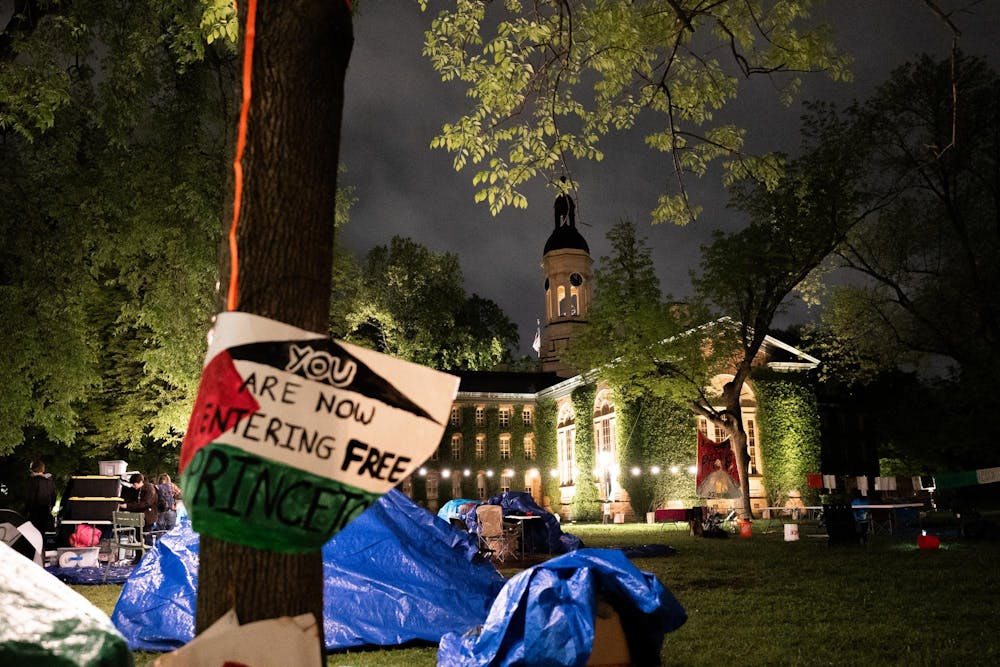The following is a guest contribution and reflects the author’s views alone. For information on how to submit a piece to the Opinion section, click here.
In response to the Gaza Solidarity Encampment that began on April 25, over a dozen student organizations sent out statements in solidarity with student protesters condemning the University’s arrest of two graduate students. I read through several letters, including the ones written by the Black Student Union (BSU), the Generational African American Students Association (GAASA), and The Arab Society of Princeton. The majority of the letters were structured similarly, explicitly acknowledging the genocide occuring in Gaza and standing in solidarity with Palestinians. I expected the Asian American Students Association (AASA)’s response to be the same.
However, I was disappointed by AASA’s weak statement, especially considering the “delay” in releasing the letter that should’ve allowed for more thoughtfulness. This was just the start of a pattern of political apathy that I would come to notice within Asian American student organizations. As Asian American students, we must continue to build our legacy of political activism in America. We cannot sit complacently atop the political laurels of our predecessors when there is so much more injustice to redress in the world, as recent responses to pro-Palestine activism has demonstrated.
There are many examples of political ignorance in AASA’s recent statements regarding recent student protests. For instance, while their open letter “explicitly acknowledge[s] the current human rights crisis,” the statement’s description of the crisis critically ignores the Israeli state’s systematic oppression and killing of Palestinian civilians, a situation that a United Nations expert has labeled as “genocide.” The language in AASA’s letter — “innocent lives being taken” — does not appropriately convey the gravity of genocide.
But above all, I believe that the AASA’s most critical failure lies in its political passivity which is inconsistent with its own history of political engagement. Even as their statement claims that “[p]eaceful protest and student/alumni advocacy are closely tied to the AASA’s roots, and we have dedicated and will continue to dedicate ourselves to these values,” it is unclear what “continue to dedicate” means when no further action has been taken beyond the publication of this letter. AASA’s historical non-violent political activism only creates a harsh contrast to its current inaction.
Further, this political isolation from the crisis in Gaza erroneously frames the issue as one on the margin of the Asian American political agenda. This overlooks a fundamental truth: the Asian American identity is both derived from cultural heritage and activist solidarity.
The Asian American identity was formed in opposition to being labeled as “oriental.” Palestinian-American writer Edward Said ’57 was essential in energizing this intellectual movement to unite people who are classified as “other” in American society through the concept of “orientalism,” a concept that was explicitly inclusive of the Palestinian identity and later adopted by other Asian identities. Given this historical context, the struggle for Palestinian liberation is fundamental to the values of solidarity and inclusion that Asian Americans are meant to fight for.
In an email from the AASA announcing the continuation of the APIDA Heritage Dinner on May 4, the continuation was defended as a measure to “show unity between Asian minorities” because “through this united front, we can support the rest of the world.” The language that Palestinians are part of “the rest of the world” implies their exclusion from the Asian community. Aside from Palestine’s geographic location in West Asia, this language demonstrates a misguided understanding of what it means to be Asian.

Consequently, it is a contradiction for AASA to claim to stand for activism and solidarity while it stays devoid from further involvement beyond their letter. AASA has the dual responsibility to celebrate Asian American cultural identity and to engage the community politically. We must expand our understanding of solidarity to include all peoples have been marginalized, along with the Palestinians who are dying from a campaign of genocide.
More critically, the majority of my criticism has primarily been directed towards the AASA thus far, solely because AASA is among the few Asian American student organizations who have even commented on the conflict at all. When silence implies complicity, the silence of several prominent Asian American campus organizations rings out louder than ever. Most notably, the Chinese Student Association (CSA), the Japanese Student Association (JSA), the Korean Student Association (KSA), the South Asian Students Association (SASA), and the Taiwanese American Students Association (TASA) have yet to release any statement regarding the protests.
There are many members of the Asian American Princeton community who are both politically active and vocal. I am not alone in my criticisms and feelings of disappointment in the student organizations that are supposed to represent me. These failures are evidence of our collective responsibility as members of the Asian American community to hold our leaders accountable for their irresponsibility. If we fail to do so, then we are also culpable.
To live up to our values of solidarity and inclusion, I urge the members of the Asian American community not only to become more politically aware and engaged in light of global events, but also to demand better leadership from the peers that we have elected to represent us. We need a stronger stance against the genocide in which our University’s silence is complicit in. Asian Americans have a long history of political activism, and it is up to us to continue this proud legacy. Let’s actually live up to AASA’s mission statement of “increasing democratic participation, civic engagement, and political consciousness” and stand up for the broader political struggles for liberation around the world.

Jacqueline Zhou is a sophomore in the philosophy department. She can be reached at jacqueline.zhou[at]princeton.edu








